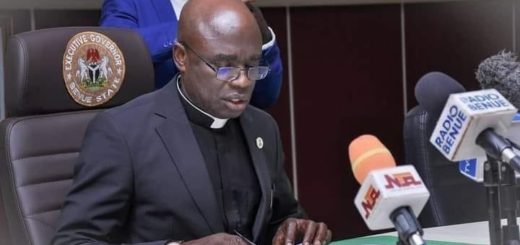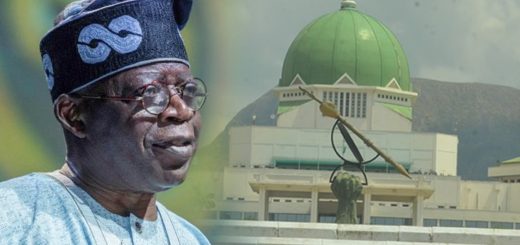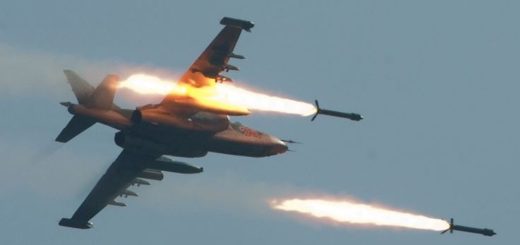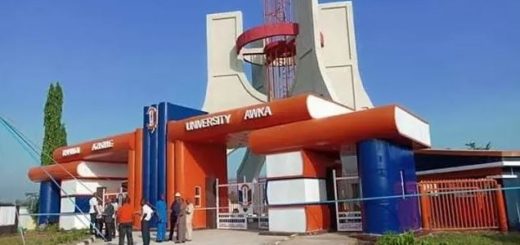Civilian volunteers helping Nigerian forces fight insurgents. But how do they operate
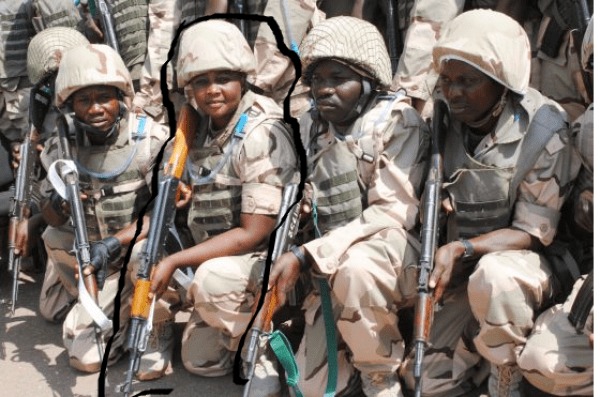 About 55,000 civilian volunteers participate in the fight against insurgency in Borno State. These volunteers are in possession of roughly 25,000 firearms, according to recent research, which raises concerns about mechanisms to keep the weapons safe against internal or external threats in line with relevant regional and international conventions.
About 55,000 civilian volunteers participate in the fight against insurgency in Borno State. These volunteers are in possession of roughly 25,000 firearms, according to recent research, which raises concerns about mechanisms to keep the weapons safe against internal or external threats in line with relevant regional and international conventions.
In the research supported by the United Nations Institute for Disarmament Research (UNIDIR), Eric Berman, the director of Safeguarding Security Sector Stockpiles (S4), identified the Borno State Hunters Association (BoSHA), the Civilian Joint Task Force (CJTF), the Kesh Kesh vigilante group and the Vigilante Group of Nigeria (VGN) as the four major Volunteer Security Outfits (VSOs) operating [mainly] in Borno and other northeastern states.
Mr Berman further explained the kind of firearms the VSO members possessed, highlighting how the weapons were procured either from local gunsmiths or the state authorities.
The weapons, he noted, include domestically-made Dane guns, foreign-manufactured hunting rifles and pump-action shotguns. Also, the VSOs have access to industrially produced assault rifles, which were mostly recovered from battlefields with the insurgents.
The research noted that the rule that weapons recovered from battlefields should be turned over to the government security forces “seems to be largely respected.”
Although some VSO members and government officials told the researcher that this mechanism is strictly followed, he opined that it is “possible that some individuals serving in VSOs may hold on to some of the recovered ammunition.”
At least 10,000 of these firearms (mainly assault rifles) recovered from the battlefield have been “likely” handed over to some VSO members. Although the Borno and federal governments, through their security forces, armed the VSOs with these weapons temporarily, they also monitored the management.
The VSOs, sources of arms unveiled
Kesh Kesh is one of the Borno-based VSOs identified by the researcher. The group, which emerged around the 1980s, is mainly based in Bama LGA — but also spread across other areas in Borno. Kesh Kesh initially had some criminally inclined members involved in rustling cattle and robbery. Its members later swore with the Quran to quit criminalities and instead “work to uphold law and order.”
According to the research, this followed community pressure. The group’s membership ranges from 500 to 1,000, and they possess an estimated 300 firearms, many of which are manufactured locally.
Kesh Kesh’s members have a transnational link with colleagues in parts of Cameroon and Chad. Sometimes, their colleagues from these countries supplement the Bama-based vigilante group and operate within Nigeria.
Another VSO spotlighted in the research is the Vigilante Group of Nigeria (VGN), which has footprints not only in Borno but also in other states across Nigeria. As stated in the research, the VGN’s membership strength in Borno as of December 2023 is around 13,000. Of these members, at least 4,000 were armed with firearms, including Dane guns, single—and double-barrelled rifles, and pump-action shotguns.
The Borno State Hunters Association (BoSHA) is the third VSO the research identified.
“BoSHA’s strength increased markedly in the second half of 2023, from around 12,000 to 16,000,” stated the researcher. “They are deployed and active in all of Borno’s 27 LGAs and are armed with locally and foreign-made single- and double-barrelled rifles – and, when serving alongside state security forces, assault rifles as well. About 10,000 of their members are equipped with firearms.”
The peak of Boko Haram’s insurgency around 2012 ignited the creation of the Civilian Joint Task Force (CJTF).
CJTF, now with a strength of 26,000 fighters in Borno alone, started as a community resistance against Boko Haram insurgents. Members initially were mainly armed with sticks, which is why they were known as “Yan Gora” —”People with Sticks” in Hausa.
The courage of Baba Jafar, a trader who apprehended a Boko Haram militant in Maiduguri and handed him over to government officials in the last quarter of 2011, motivated many people to join the sticks-wielding group.
Nigerian security forces started calling the group the CJTF “as both a compliment and a complement” to the government’s Joint Task Force (JTF).
The VSOs exploited thriving illicit arms trade, directly sourcing locally-made and (a sizable number of) industrially-produced firearms without the authorisation or support of the governments, the research found.
Factors such as licensing and the cost of procuring industrially produced firearms, among others, still explain why VSOs do not have significant access to these sophisticated foreign arms.
The research also found that several federal government security agencies and Borno State bodies and actors provide or help procure firearms for Borno-based VSOs, noting that the authorities do so directly or indirectly.
This finding corroborates a PREMIUM TIMES report on how 13 ex-Boko Haram fighters co-opted into counterinsurgency operations escaped with government rifles and motorcycles.
At the local government level, the council chairpersons have also helped the VSOs secure access to industrially produced guns and artisanal Dane guns through the divisional police officers (DPOs) to whom these firearms were given for onward distribution across the 27 LGAs in Borno.
The research revealed that about 2,000 firearms distributed through the DPOs were procured through the Borno State Security Trust Fund (BSSTF), an initiative established in 2019 but became operational in 2020.
“A little more than half of these weapons – shotguns exclusively – have been allocated to members of the CJTF,” the research found. “BoSHA, Kesh Kesh, and VGN members have received slightly less than half, which include both shotguns and hunting rifles.”
VSOs armed without clear adherence to recognised conventions
At the centre of the research is the concern of arms management. The research observed that it is unclear the extent to which legal and regulatory frameworks at the national level, including the 1959 Firearms Act, are adhered to in arming these VSOs.
“Borno state officials have interpreted Nigerian laws and regulations on firearms control to restrict the provision of certain types of firearms to all VSO members,” the research stated, adding: “In some cases, the arming of VSO members resembles basic training for military conscripts, rather than an authorisation process for civilian possession of firearms. Overall, it has proven challenging to understand the conditions imposed on recipients of assault rifles.”
The researcher highlighted scenarios that likely disregard adherence to firearms laws. According to him, efforts to account for arms provided to VSOs between 2015 and 2019 proved abortive as the Borno authorities simply “understood the country’s 1959 Firearms Act as prohibiting the provision of most types of firearms to civilians, but the security situation was deemed to require the arming of civilians.”
Given the sensitive nature of such actions, officials did not adhere fully to established record-keeping practices, the researcher argued, grouping firearms management into two: direct and indirect.
The latter focuses on measures aimed at discouraging misuse and misallocation of firearms and ammunition. Such measures are recruitment, vetting, oversight, retention, remuneration, and benefits practices for VSOs.
Additionally, the measures consider alternative livelihood training programmes for both armed and unarmed VSO members to mitigate the demand for weapons and reduce the risk of their unintended use. This addresses the growing concern of inequity among VSO members, often referred to as the “haves versus have nots issue.”
Meanwhile, the former focuses on firearms management practices to promote accountability and good practices. Here, the researcher explained efforts to safeguard arms against external threats and internal challenges. While safeguarding against internal challenges involves clearer and more straightforward steps like marking, record-keeping, and physical security, the focus is primarily on external threats.
Observations and recommendations
This research identified several key observations and questions for further exploration. The study indicates that these observations have important implications for good governance, peace and security beyond Borno and northeastern Nigeria.
As part of the observations, the research author noted that armed VSOs are becoming increasingly prevalent in Nigeria, expanding their operations beyond Borno State. This raises questions about their appropriate roles, how to prevent politicisation, protect them from retaliation, and reduce the need for their services through improved security sector performance.
He also explained that VSOs possess many firearms obtained through various means. “While the state has implemented restrictions, concerns remain about the proliferation of these weapons. Further research is needed to understand the types of weapons possessed, their sources, and effective control measures.”
Of great concern is the inconsistencies in the accounts of how state security forces provide arms to VSOs. The researcher believes further investigation is necessary to clarify the types of weapons provided, their documentation, and measures to prevent misuse and diversion.
Information on VSO armouries and depots is limited, hindering the assessment of their ability to counter diversion efforts. He observed that additional measures are needed to secure storage facilities and provide stockpile management training.
The research further highlighted some considerations for the Borno State government regarding the Borno State Security Trust Fund. He advised the state government to check with each DPOs that has received weapons from the Fund to determine the record-keeping systems employed. Additionally, he advised that the state gather information from these DPOs about how weapons are distributed and the number of weapons still held and secured by the VSOs that have received them.
The researcher also admonished the army to uniquely mark firearms furnished to the VSOs based on regional and international commitments and obligations undertaken by Nigeria, particularly Article 18 of the ECOWAS SALW Convention.
“Unmarked arms can be included in ongoing Nigerian programmes to mark all small arms and firearms in the country,” he advised, adding the army should store details about distributed firearms in a “centralised secure database or register in accordance with Articles 9 and 14 of the ECOWAS SALW Convention. Additional information to include in the database can include the location of the arms.”
He recommended that the army expand the training of the VSOs to support efforts to secure and safeguard arms and ammunition against diversion and misuse. The researcher also called for the provision of secure storage infrastructure.
He told the police that checks should be made on firearms licences granted to civilians to ascertain how many weapons remain in circulation and in the licensee’s possession.
“If the data is not stored electronically and centrally, consideration might be given to doing so,” he said, noting priority should be given to Borno state’s 27 LGAs, followed by practices across Adamawa and Yobe states.
Advising the state and federal governments, including their partners such as the United Nations and civil society, the researcher said efforts should be made to connect with VSO members serving in some hinterlands who have not benefited from existing training, equipping, and payment frameworks to the same extent as those located in the state capital, Maiduguri, and the surrounding LGA, Jere.
He recommended investigating artisanal weapons production in Nigeria to gain a better understanding of supply and demand factors. This includes examining production costs, types of weapons produced, production capacity, and the skill level of artisans involved. Such information would contribute to ongoing efforts within the ECOWAS to address the issue of craft-produced weapons.
He suggested that the National Centre for the Control of Small Arms and Light Weapons (NCCSALW) could lead this initiative, which could ultimately help to better understand the holdings of VSOs in the region.
Also, he recommended that an “NCCSALW destruction centre” be constructed in Maiduguri to process material the security forces recover from Boko Haram and transfer to the centre.
According to him, all arms and ammunition should be documented and analysed before destruction.
